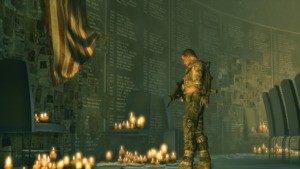
Spec Ops: The Line owes a lot to the Uncharted series — and not just because Nolan North lends his voice to the game’s gruff protagonist Captain Martin Walker. The combat – which takes place from a third-person perspective – is hugely derivative of Nathan Drake’s series, as you meander between conveniently placed vehicles and debris to seek cover from incoming gunfire. As such, it’s the sun-baked city setting and compelling society-in-disarray storyline that makes 2K Games’ series reboot a compelling prospect. But is it enough?
Developer Yager’s certainly learned some tremendous visual tricks in the three years it’s had to work on Spec Ops: The Line. Despite running on the grungy Unreal Engine, the game’s pseudo post-apocalyptic Dubai setting is a real sight to behind. Colourful and chaotic; the developer’s done a sublime job of capturing the natural beauty of the tropical setting and blending it with the gratuitous violence at the centre of the plot. It’s simply refreshing to explore a real-life video game location that’s not set in North America – and Yager deserves kudos for attempting to capture such an interesting (and under-represented) city.
The extent of Dubai’s decline is highlighted in our opening moments with the game. We find ourselves observing the city from the side of a thundering military helicopter, as pristine skyscrapers transition into crumbled constructions and the reality of the catastrophic sandstorms – which we’re informed are the cause of the location’s decay – become increasingly evident.

But we have little time to reflect as several other bandit hinds take position on our rear and attempt to shoot us out of the sky. Given orders to return fire, we participate in an explosive on-rails shootout above the torn skyline of Dubai: and then the narrative rolls back in time.
One thing Spec Ops: The Line is not afraid to do is build tension. Despite the bombastic nature of our demo’s opening, the next 10-15 minutes find us simply walking through the city’s sandy outskirts, soaking up the anarchy that occurred before our overdue arrival.
Our mission is to locate Colonel John Konrad (a reference to Joseph Conrad, the author of the novel which the game is based upon). Konrad is a war veteran who refused to evacuate the city, instead opting to stay behind with his squad in order to help protect civilians. But it soon becomes evident – for reasons not explained in our demo – that Konrad is far from the respectable war veteran that his status suggests, and that he has other, less honourable reasons for staying behind in Dubai.
The narrative hook is a good one, and there are hints in our demo that Spec Ops: The Line will toy with darker psychological emotions, such as paranoia, as the plot persists. It’s just a shame that the moment-to-moment action is significantly less ambitious.
Make no mistake, the gunplay is rock solid, but we found it hard to shake the sentiment of déjà-vu during our 50 minute hands-on. Weapons rattle with power as we face-off against mercenaries and even – shock – some of the trained militants from Konrad’s crew. Differing enemy types force us to adopt new strategies, as we shutdown knife-wielding foes in close-quarters and snipers at distance. It’s good, but a little too familiar.

Refreshingly, Spec Ops: The Line is a brutally challenging game, as evidenced by the sheer amount of times we found ourselves staring at the Game Over screen. Ammo is limited and enemies have good aim, forcing intelligent use of scattered cover.
To compensate, Yager has attempted to incorporate some of the strategy elements from the Spec Ops titles of old. A tap of the trigger brings up tactical options, such as the ability to send out a flash bang or target a specific threat. The latter is especially handy when we come up against a foe armed with an RPG later in the demo.
There’s also the implication that sand will play a big part in the level design. In one shootout we find ourselves ambushed, but able to take the upper hand by shooting out the windows of a sand-filled bus and burying our foes beneath several layers of debris. The sand itself is well animated, adding atmosphere to the environments as it swirls in the breeze and responds to every stray gunshot.
But despite the confined nature of the game’s tropical setting, there’s evidence of decent variety during our relatively brief hands-on. We start out on a deserted highway and progress into building foyers and sky-scraper rooftops. Regardless of location, the game has a very colourful art-style that contrasts against its dark, brooding narrative.

Our time with Spec Ops: The Line certainly left us intrigued, largely because of the mysterious nature of its plot. The idea of a survivor turned rogue under extreme conditions has an air of Lord of the Flies about it, and we sincerely hope the final narrative delivers on the psychological elements our demo teased. The combat does feel like a means to an end, but with only two chapters on display it’s hard to get a sense of how much variety the full campaign will contain. The shooting itself is certainly above average, and while not especially original, is enhanced by challenging AI.
There might not be a great need for another cover-based third-person shooter on PS3, but Spec Ops: The Line seems to have enough drama baked into its plot and setting to find a niche. We’ll find out for certain when the title releases in June.


Comments 2
Looks so good!
@Slapshot It is pretty.
Leave A Comment
Hold on there, you need to login to post a comment...